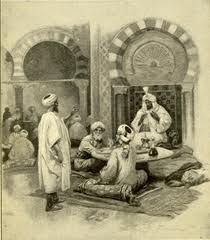 “Once a Caliph saw his teeth falling out in a dream. He called a dream interpreter and asked him about the meaning of his dream. The interpreter replied: ‘The entire family of my master will perish.’ The Caliph became upset, and called for another interpreter and told him the dream. The second dream interpreter replied: ‘The dream of my master, the prince of believers, is true, for he shall live the longest amongst his relatives.’ Immediately the Caliph embraced the man and rewarded him for his skill and tactfulness.” (quoted in Amira Mittermaier, “Dreams That Matter: Egyptian Landscapes of the Imagination,” p. 63)
“Once a Caliph saw his teeth falling out in a dream. He called a dream interpreter and asked him about the meaning of his dream. The interpreter replied: ‘The entire family of my master will perish.’ The Caliph became upset, and called for another interpreter and told him the dream. The second dream interpreter replied: ‘The dream of my master, the prince of believers, is true, for he shall live the longest amongst his relatives.’ Immediately the Caliph embraced the man and rewarded him for his skill and tactfulness.” (quoted in Amira Mittermaier, “Dreams That Matter: Egyptian Landscapes of the Imagination,” p. 63)
Dreams That Matter: Egyptian Landscapes of the Imagination
 I’ve just read an excellent new book, Dreams That Matter: Egyptian Landscapes of the Imagination, by Amira Mittermaier (University of California Press, 2011). The following two paragraphs are from a review that will appear in the next issue of the IASD magazine Dream Time.
I’ve just read an excellent new book, Dreams That Matter: Egyptian Landscapes of the Imagination, by Amira Mittermaier (University of California Press, 2011). The following two paragraphs are from a review that will appear in the next issue of the IASD magazine Dream Time.
Important new books on dreams and Islam have been coming out faster than this reviewer can keep up with them. In the last issue of Dream Time I wrote about Iain Edgar’s The Dream in Islam: From Qur’anic Tradition to Jihadist Inspiration. In this issue I review Dreams That Matter: Egyptian Landscapes of the Imagination by Amira Mittermaier, an Assistant Professor of Religion at the University of Toronto. Mittermaier’s work won the American Academy of Religion’s 2011 book award for Excellence in the Study of Religion in the Analytic-Descriptive Category. Based on her dissertation fieldwork, the book explores the lively yet hotly contested terrain of dreaming in contemporary Egypt. Whereas Edgar’s work takes a broad historical view of dreaming in Islam and then focuses on a particular type of dream experience (jihadist inspiration dreams), Mittermaier’s approach is to delve deeply into the ethnographic details of particular people’s lives in Egyptian culture and then open the discussion to broader issues and debates in Islamic teachings about dreams, revelation, and the imagination.
Mittermaier brings a unique personal background to her research topic. She was raised in Bavaria by a German father who was a neurologist and by an Egyptian mother who was a Jungian psychotherapist. Her upbringing gave her a deep familiarity with the ideas of Freud and Jung—and a conviction that the individual-centered theories of psychoanalysis were missing something important about the transpersonal dimensions of dreaming: “Intrigued by this apparent tension between Elsewhere-oriented and psychoanalytic dream models, I wanted to explore what it means for dreamers in the world today to be extended outward as opposed to inward.” (14)
I’ll post the rest of the review once the Dream Time issue appears, some time in the next few weeks.
